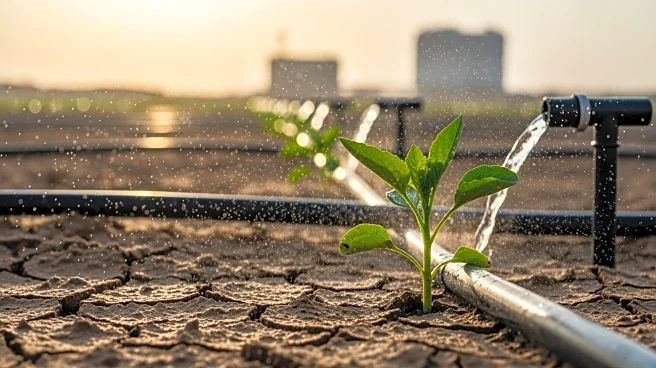What's Happening?
Israel is achieving remarkable success in agriculture despite its challenging environment, characterized by 60% desert coverage and significant water scarcity. The country has implemented advanced technologies
such as desalination and drip irrigation to transform its arid landscape into productive farmland. These innovations have enabled Israel to harvest up to 300 tons of tomatoes per hectare, exporting luxury foods to Europe. Desalination, which removes salt from seawater, provides a substantial portion of Israel's drinking water, freeing up natural resources for agricultural use. Additionally, Israel purifies wastewater for irrigation, reducing the need for chemical fertilizers and promoting sustainable farming practices. The government treats water management as a national security issue, establishing strict quotas and encouraging water-saving technologies.
Why It's Important?
Israel's approach to agriculture serves as a global model for sustainable resource management in arid regions. By integrating desalination, wastewater reuse, and efficient irrigation techniques, Israel has turned its environmental challenges into opportunities for innovation. This strategy not only ensures food security but also positions Israel as a leader in agricultural technology. The success of these methods highlights the potential for other countries facing similar challenges to adopt similar practices, potentially transforming global agricultural productivity. Furthermore, Israel's advancements in seed genetics and irrigation efficiency contribute to its reputation as one of the most efficient agricultural producers worldwide, offering valuable lessons in resilience and resourcefulness.
What's Next?
Israel's continued investment in agricultural technology and water management is likely to further enhance its productivity and sustainability. The country is expected to expand its export markets, leveraging its agricultural innovations to strengthen economic ties with other nations. Additionally, Israeli engineers and scientists may increasingly share their expertise globally, assisting other countries in adopting similar technologies to combat water scarcity and improve agricultural output. As climate change intensifies, Israel's model could become increasingly relevant, prompting international collaborations and policy shifts towards sustainable resource management.
Beyond the Headlines
Israel's agricultural success underscores the importance of viewing environmental challenges as opportunities for innovation. The country's focus on desalination and wastewater reuse not only addresses immediate water scarcity but also contributes to long-term sustainability. This approach reflects a broader trend towards integrating technology with environmental stewardship, emphasizing the need for cooperation and strategic planning in resource management. Israel's achievements may inspire ethical considerations regarding the equitable distribution of technological advancements and the role of government in ensuring sustainable practices.










